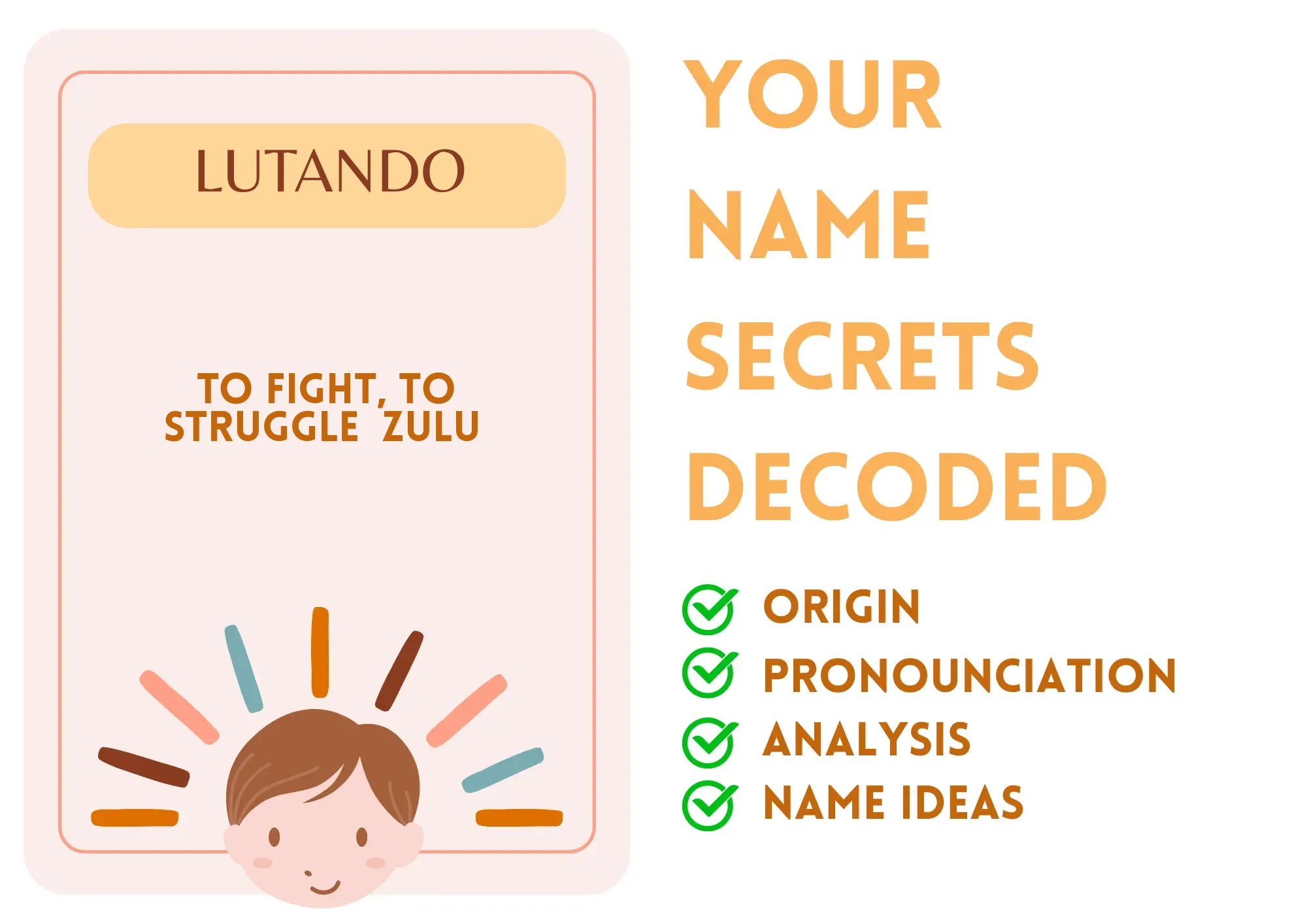
Lutando
Lutando is a name of African origin, primarily associated with the Zulu and Xhosa cultures in Southern Africa. It is derived from the Zulu word 'ukulutanda,' which means 'to fight' or 'to struggle,' symbolizing resilience and strength. This name is commonly used for males and carries significant cultural weight, as it denotes the ability to persevere through challenges.
In many African cultures, names are deeply symbolic and often reflect the hopes and values of the family. Lutando, therefore, represents the spirit of determination and the will to overcome obstacles. It's a name that parents choose with pride, instilling a sense of courage and tenacity in their children.
The name is generally well-received, evoking feelings of strength and bravery. It is relatively easy to pronounce, though its unique sound may be a bit unfamiliar to those outside its cultural context. Common nicknames include 'Tando' and 'Lulu.' Lutando also appears in contemporary African literature and narratives, representing themes of activism and struggle.
Basic Information
Gender: Boy
Sounds Like: loo-TAN-do
Pronunciation Explanation: The emphasis is on the second syllable 'TAN', while 'loo' and 'do' are pronounced as they are spelled.
Summary and Meaning
Meaning: to fight, to struggle (Zulu)
Origin: The name Lutando originates from the Zulu language, which is a prominent language in South Africa.
Usage: Lutando is traditionally a masculine name, embodying traits of strength and struggle.
Name Number (Chaldean)
Name Number (Pythagorean)
Popularity (Global Rank)
Overall: 132685
Boys: 72681
Most Popular in
Religious and Cultural Significance
Religion: Traditional African
Background: In many African cultures, names like Lutando are significant, often linked to traditional beliefs that celebrate valor and determination.
Cultural Significance: Lutando embodies virtues of bravery and perseverance, making it a popular choice for parents wishing to instill strength in their sons.
Historical Significance: Historically, names in African cultures often convey important messages of struggle and achievement, embodying the spirit of overcoming adversity, which is reflected in the name Lutando.
Popular Culture
Literature and Mythology: Lutando may feature in contemporary African literature, commonly representing themes of social justice and fight against oppression.
Movies and Television: While Lutando may not yet have widespread representation in international films, it serves as a powerful touchstone in regional storytelling, symbolizing resilience.
Feelings and Perceptions
Perception: Lutando is perceived positively, symbolizing strength, bravery, and resilience.
Positive Feelings: Strong, resilient, courageous, determined.
Negative Feelings: Unfamiliar to some, complex origin might lead to pronunciation issues for non-native speakers.
Practical Considerations
Ease of Writing and Calling: Lutando is reasonably simple to write and pronounce, consisting of seven letters and three syllables, making it memorable and straightforward.
Common Typos and Misspellings: Litando,Lutondo,Lutany
Common Nicknames: Tando,Lu,Lulu
Lutando Popularity
Lutando Usage and Popularity By Country
| Country | Rank (Overall) |
|---|---|
| South Africa | 7166 |
| Norway | 27537 |
| Sweden | 31840 |
| United Kingdom | 182431 |
| Brazil | 261267 |
| United States | 344452 |
Lutando Usage and Popularity By City
| City | Rank (Overall) |
|---|---|
| Johannesburg | 8838 |
| Cape Town | 4927 |
| Bisho | 1144 |
| Port Elizabeth | 2708 |
| Philadelphia | 18057 |
| Kimberley | 1739 |
Compatibility Analysis
Famous Persons Named Lutando
No results found for Lutando.
Related Names
Similar Sounding Names:
Lutando,Luthando,Thando